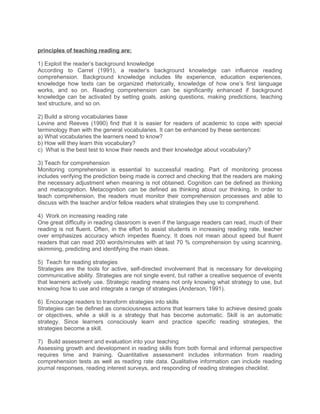
Reading
- 1. principles of teaching reading are: 1) Exploit the reader’s background knowledge According to Carrel (1991), a reader’s background knowledge can influence reading comprehension. Background knowledge includes life experience, education experiences, knowledge how texts can be organized rhetorically, knowledge of how one’s first language works, and so on. Reading comprehension can be significantly enhanced if background knowledge can be activated by setting goals, asking questions, making predictions, teaching text structure, and so on. 2) Build a strong vocabularies base Levine and Reeves (1990) find that it is easier for readers of academic to cope with special terminology than with the general vocabularies. It can be enhanced by these sentences: a) What vocabularies the learners need to know? b) How will they learn this vocabulary? c) What is the best test to know their needs and their knowledge about vocabulary? 3) Teach for comprehension Monitoring comprehension is essential to successful reading. Part of monitoring process includes verifying the prediction being made is correct and checking that the readers are making the necessary adjustment when meaning is not obtained. Cognition can be defined as thinking and metacognition. Metacognition can be defined as thinking about our thinking. In order to teach comprehension, the readers must monitor their comprehension processes and able to discuss with the teacher and/or fellow readers what strategies they use to comprehend. 4) Work on increasing reading rate One great difficulty in reading classroom is even if the language readers can read, much of their reading is not fluent. Often, in the effort to assist students in increasing reading rate, teacher over emphasizes accuracy which impedes fluency. It does not mean about speed but fluent readers that can read 200 words/minutes with at last 70 % comprehension by using scanning, skimming, predicting and identifying the main ideas. 5) Teach for reading strategies Strategies are the tools for active, self-directed involvement that is necessary for developing communicative ability. Strategies are not single event, but rather a creative sequence of events that learners actively use. Strategic reading means not only knowing what strategy to use, but knowing how to use and integrate a range of strategies (Anderson, 1991). 6) Encourage readers to transform strategies into skills Strategies can be defined as consciousness actions that learners take to achieve desired goals or objectives, while a skill is a strategy that has become automatic. Skill is an automatic strategy. Since learners consciously learn and practice specific reading strategies, the strategies become a skill. 7) Build assessment and evaluation into your teaching Assessing growth and development in reading skills from both formal and informal perspective requires time and training. Quantitative assessment includes information from reading comprehension tests as well as reading rate data. Qualitative information can include reading journal responses, reading interest surveys, and responding of reading strategies checklist.
- 2. 8) Strive for continuous improvement as a reading teacher Good reading teachers actively teach students what to do and understand the nature of the reading process. Reading teachers need to be passionate about their work. They should view themselves as facilitators, help each reader discovers what work best. Integrating the key principles discussed above can lead to more effective reading instruction in the language classroom. principles of teaching reading are:
